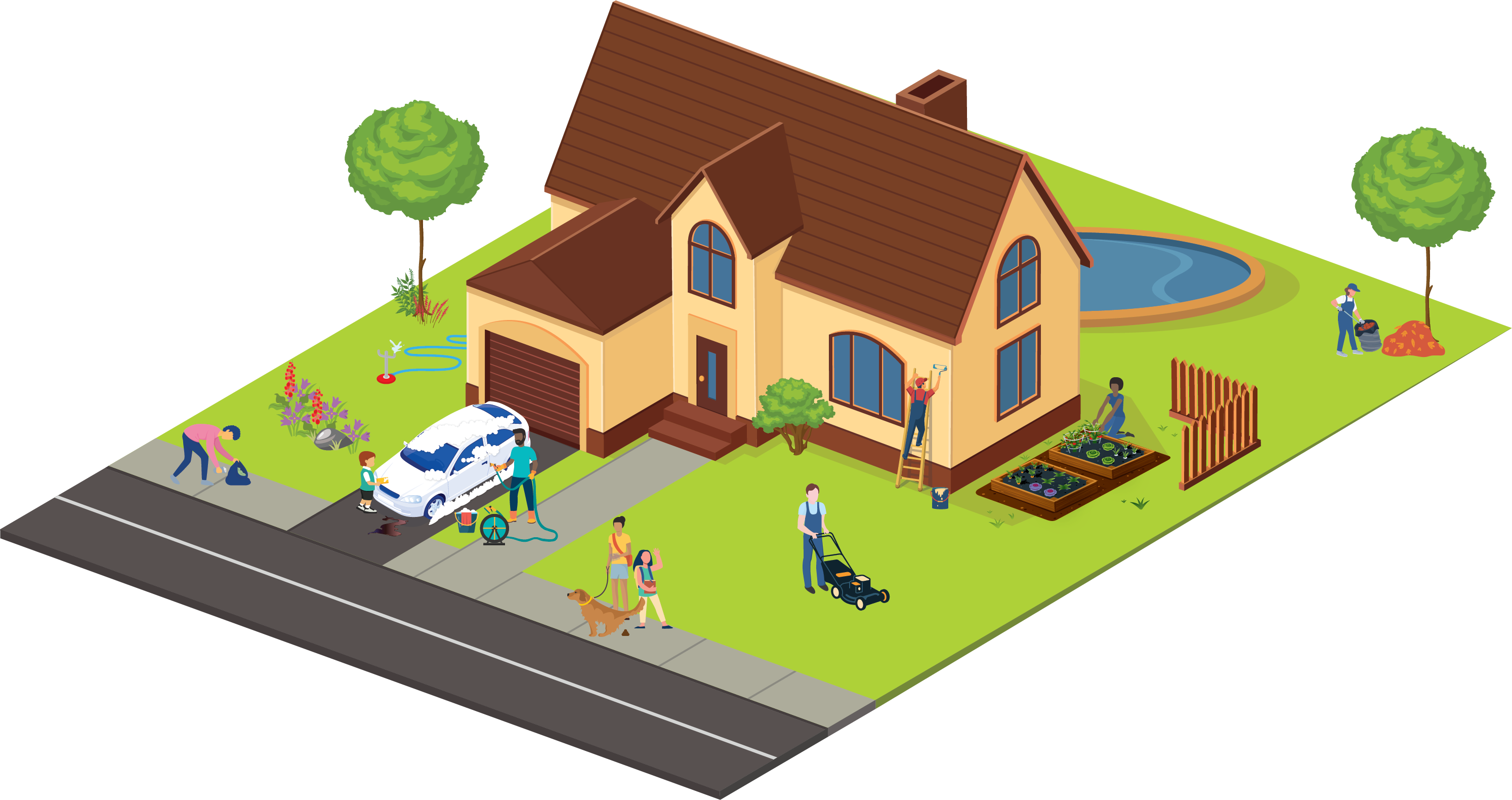How You Can Protect Stormwater In and Around Your HomeDrew Matamales2021-02-02T15:06:45-08:00
Did you know that we get an average of 20.4 inches of rain per year in Lincoln? Have you ever wondered where all that water goes? In natural areas where urban development hasn’t occurred, stormwater absorbs into the ground. However, where urban development has occurred, there are more impervious surfaces, like rooftops, paved roads, and driveways, which limit the ability of the stormwater to be absorbed into the ground. As a result, stormwater flows across rooftops, over the ground, through gutters, into storm drains, and ultimately into the local waterways.
As the stormwater flows over the urban landscape, it picks up and carries whatever it comes into contact with along the way. This may include animal waste, automobile fluids, pesticides, litter, and other pollutants, which may harm local waterways.
Click on the numbers below to understand how the activities that occur in and around your home may impact stormwater and how YOU can help prevent stormwater pollution. Remember—clean water starts with you!
Graphics courtesy of the City of Roseville.
1

Wind and rain can carry trash that is on the road and sidewalk into storm drains. Once trash enters the storm drains it can either clog the drain and cause flooding, or it can flow into the local waterways where it can harm the aquatic wildlife.
- Never put or dispose of anything in the storm drain or drainage ditch.
- Keep garbage can lids secure to prevent wind from carrying trash onto the ground.
- Read more tips on our Trash page.

Water conservation is crucial to help prepare our community for future droughts and effects of climate change. Whether it’s falling from the sky or coming through our pipes, water is a precious resource that we all must help conserve.
- Sunrise/sunset watering: Water your lawn early in the morning or in the late afternoon when evaporation from the sun is low and the water has time to soak into the soil.
- Install a water catchment system: Rain barrels and cisterns help collect water which can be used to water lawns and gardens.
- Learn more water conservation tips on our Yard & Water Management page.

Follow some simple automotive best practices to keep your car—and the environment—running smoothly.
- Conduct regular car maintenance.
- Lincoln residents have 2 FREE resources to help with properly disposing used oil, oil filters, antifreeze, and car batteries:
1) OneBigBin curbside pickup service offers hazardous waste disposal by appointment
2) The Western Placer Waste Management Authority’s (WPWMA) hazardous waste disposal site in Lincoln.
- Additional automotive best practices can be found on our Car Maintenance page.

When you wash your car in the driveway or on the street, the wash water contains detergent, motor oil, gas, and other residues and can flow into nearby storm drains and ultimately the local creeks without being treated. Here are some steps you can take:
- Take your vehicle to commercial car wash facilities that recycle or treat the wash water.
- Wash your car on a permeable surface like grass or gravel to allow the ground to absorb the wash water and filter the soap and other residue.
- Learn more tips on our car washing Car Washing page.

A single gram of dog waste contains 23 million bacteria, viruses, and/or parasites! When left on the ground, it decomposes and is either transported by water into the street and storm drain.
- Always bring plastic bags to pick up after your dog on walks and dispose of it in trash cans (not green waste bins).
- Pet waste is not only harmful, it's also against local Placer County laws to leave pet waste behind.
- Read more tips on our Pet Care page.

If yard waste (grass clippings, branches, leaves, and twigs) enters our creeks, it then acts as a fertilizer that can create excess algae growth and decrease the water’s oxygen supply, suffocating fish and spoiling water recreation.

Household hazardous waste (HHW) such as paint, automotive fluids, batteries, and pesticides may be corrosive, toxic, or flammable. They should be disposed of with a HHW facility instead of household garbage or poured/rinsed in a storm drain. Two FREE services for Lincoln residents:

Integrated Pest Management (IPM) offers natural and effective alternatives to conventional methods, which rely primarily on the application of pesticides. Pesticides not only cause harm to our environment and our health, they also only treat the symptom rather than the cause of pest problems.
- Look at environmental factors that affect the pest and its ability to thrive.
- Create conditions that are unfavorable for the pest.
- Learn about other IPM practices and examples on our Gardening & Pesticides page.

Water from pools and spas often contains chemicals that are necessary for the use of the pool or spa, but that can be harmful to aquatic life and water quality. The information below explains where to discharge the water when you need to drain your pool or spa and how to properly dispose of pool-related wastes.
- Best Option - Draining your pool or spa water to the sanitary sewer (only option for saltwater pools).
- Using Storm Drains
- Read our guidelines for pool drainage, maintenance, construction, and chemical handling on the Pools & Spas page.

Leaves are messy! They can get carried away by stormwater or the wind and eventually end up in the storm drains. This can cause clogging within the storm drain and tribute to flooding in your neighborhood.
- To get rid of leaves, rake them, bag them, if you live in the map area the City will stop by to grab them from November 1 through December 31!
- Residents who don't live in the map area can call for a free pickup of your bagged leaves—but only during the month of December!
- Learn more about Lincoln's Leaf Collection Program here.


